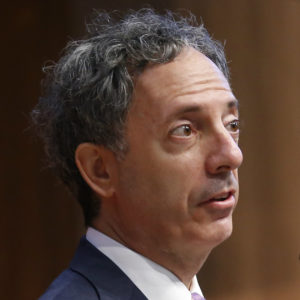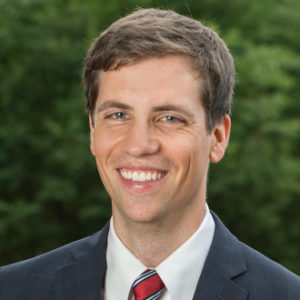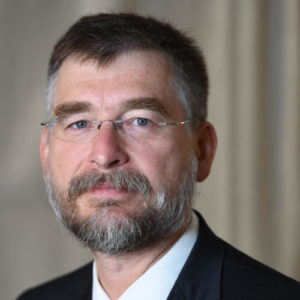Aristotle
Engage in close study of Aristotle’s Nicomachean Ethics and Politics.
Summer 2017
Washington, DC
This course will focus on Plato’s Republic, perhaps the greatest work of political philosophy ever written. With close and sensitive study, we will examine central questions that are raised by Plato, such as: What is justice? Who should rule? What are the characteristics of the best political regime—and are there worthy alternatives if the best political regime is unattainable?
Image: Frederic Edwin Church, Parthenon, oil on canvas, 1871
Bryan Garsten on the history of political thought

Bryan Garsten is Professor of Political Science at Yale University. He writes on questions about political rhetoric and deliberation, the meaning of representative government, the relationship of politics and religion, and the place of emotions in political life.

Bryan Garsten is Professor of Political Science and Chair of the Humanities Program at Yale University. He is the author of Saving Persuasion: A Defense of Rhetoric and Judgment (Harvard University Press, 2006), as well as articles and essays on questions about political rhetoric and deliberation, the meaning of representative government, the relationship of politics and religion, and the place of emotions in political life.
He is finishing a book called The Heart of a Heartless World that examines the ethical, political and religious core of early nineteenth-century liberalism in the United States and France. He has also edited Rousseau, the Age of Enlightenment, and Their Legacies (Princeton University Press, 2012), a collection of essays by the Rousseau scholar Robert Wokler. His writings have won various awards, including the First Book Prize of the Foundations of Political Theory section of the American Political Science Association.
He has served as Director of Undergraduate Studies for Yale’s major in Ethics, Politics and Economics and the Director of Graduate Studies for the Department of Political Science. In 2016 he founded the Citizens, Thinkers, Writers program for students in the New Haven public schools.
Readings:
Discussion Questions:
Readings:
Discussion Questions:
Readings:
Discussion Questions:
Readings:
Discussion Questions:
Readings:
Discussion Questions:

Robert C. Bartlett
Robert C. Bartlett is the Behrakis Professor of Hellenic Political Studies at Boston College. His principal area of research is classical political philosophy, with particular attention to the thinkers of ancient Hellas, including Thucydides, Plato, and Aristotle. He is the co-translator of a new edition of Aristotle’s Nicomachean Ethics.

Bryan Garsten
Bryan Garsten is Professor of Political Science at Yale University. He writes on questions about political rhetoric and deliberation, the meaning of representative government, the relationship of politics and religion, and the place of emotions in political life.

Benjamin Storey
Benjamin Storey is Associate Professor of Politics and International Affairs at Furman University. His interests focus on the history of political philosophy. He is currently completing a book entitled The Restless Age: Four French Thinkers on the Quest for Self-Understanding in an Unsettled Modernity.

Peter Berkowitz
Peter Berkowitz is the Tad and Dianne Taube Senior Fellow at the Hoover Institution, Stanford University. He studies and writes about, among other things, constitutional government, conservatism and progressivism in America, liberal education, national security and law, and Middle East politics.

Antón Barba-Kay
Antón Barba-Kay is Associate Professor of Philosophy in the School of Philosophy at the Catholic University of America in Washington, D.C. He is finishing a book on the political philosophy of the internet, which he began while a Visiting Fellow in the James Madison Program at Princeton University.

Jakub Grygiel
Jakub Grygiel is an Associate Professor at the Catholic University of America. From 2017–18, he was a member of the Policy Planning Staff at the U.S. Department of State. His most recent book is Return of the Barbarians: Confronting Non-State Actors from Ancient Rome to the Present.

Ryan P. Hanley
Ryan Patrick Hanley is Professor of Political Science at Boston College. His research in the history of political philosophy focuses on the Enlightenment. He is the author of Our Great Purpose: Adam Smith on Living a Better Life and Love’s Enlightenment: Rethinking Charity in Modernity.